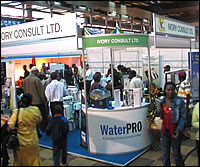Beyond Crystal Clarity

 |
| The Ivory Consult stand at the Expo |
Anthony: What is Ivory Consult all about?
Clive: Ivory consult is a company involved in water testing, treatment, purification and consultancy for both domestic and industrial use. We also perform environmental impact assessments and audits. We have our offices and laboratories in Nairobi’s Industrial Area.
Anthony: You just won the first prize in Product Development, what does this mean to Ivory Consult?
Clive: It is a great honour for us to win the prize in a competitive environment that brings together the best home service and product providers in the region. The prize is also an indicator that our presence is being felt positively. We are therefore not just in business: we are fulfilling a noble purpose.
Anthony: What are your products?
 |
| One of the purification units |
Anthony: How do the water systems work?
Clive: Our water purification systems make use of ultraviolet (UV) light and reverse osmosis (forcing a solvent from a region of high solute concentration through a membrane to a region of low solute concentration by applying a pressure). A single unit has a minimum of four purification levels. The first level is a cylinder which filters the water free of micron-tiny sediments. The second level eliminates any traces of chlorine and any other chemical compounds. The third level frees the water of all heavy metals like lead, magnesium and carbon deposits while the fourth level eliminates pathogens (disease causing elements) and any smell from the water source by use of UV light.
Anthony: Why would one choose your systems in place of bottled water?
Clive: Our business model is based on raising the health standards of everyone at affordable costs. For Instance, a family of six consuming 40 litres of drinking water a day will spend an average of $ 35 a day on bottled water. This translates to $ 12800 in one year. The smallest of our units that has the capacity to purify 300 litres of water per day costs about $ 615; this is a unit whose cylinders last for six months with a replacement cost of $ 40 thereafter. The total cost is $ 655 in the first year and $ 80 dollars per year for the subsequent years. Our units are not only ten times cheaper, but they also carry an assurance of the best quality of water because one is assured that the water they take has indeed passed through a purification process.
Anthony: within the period you’ve been in operation, what has been your impact?
Clive: If the number of our ever growing clientele and their feedback is anything to go by, our presence has been felt. However, we are not satisfied by mere presence. We are moving into communities where there is water scarcity and villagers are prone to water borne diseases because they all crowd in area with little water supply. To this end, we have set up water distribution lines in Kibwezi (Eastern Kenya) and Laikipia (Rift Valley). The projects are run in a ‘cooperative’ model where we first train people to manage and own the entire project we also give them legal knowledge to guard their project against interference. From an appreciative inquiry of the areas in which we have set up the projects, we are able to advise the people on viable income generating activities. In Kibwezi, we have advised farmers to grow drought resistant crops like cotton, where they have a direct market access from a ginnery we have linked them up with. In Laikipia where livestock farming is more viable, the otherwise skinny animals can now drink water making them healthy and therefore fetch better prices in the competitive market.
Anthony: Where do you see Ivory Consult in Five Years?
Clive: Our business will have grown by over 70% within the next three years and by the fifth year, we will have set up a local manufacturing and assembling plant for all the equipment we need for our water systems, since most of what we use now are imported. We are also carrying out a research on clean and sustainable energy generation; an arm I believe will be in its implementation phase in the next two years. Ivory Consult will be a continental water solution company whose position in the market will be unrivalled.
